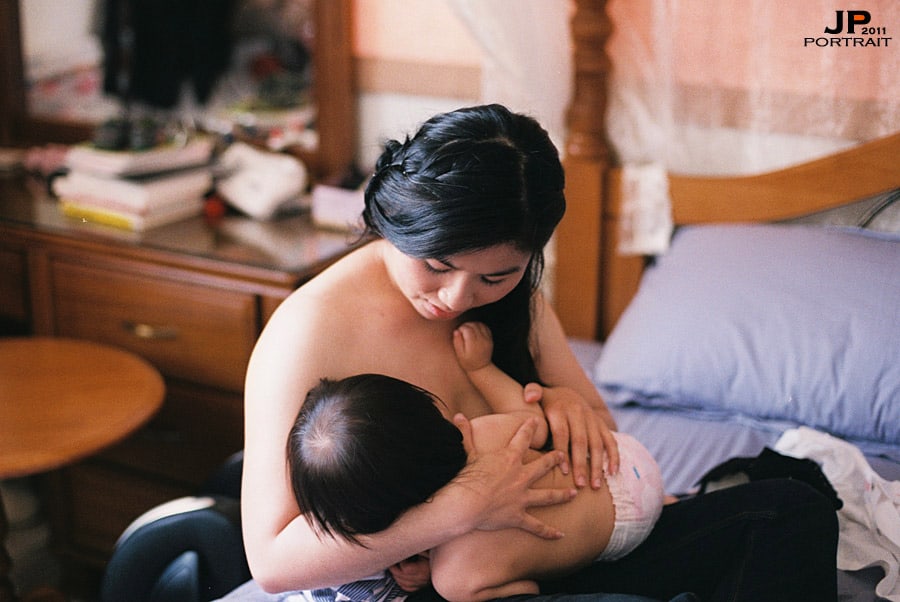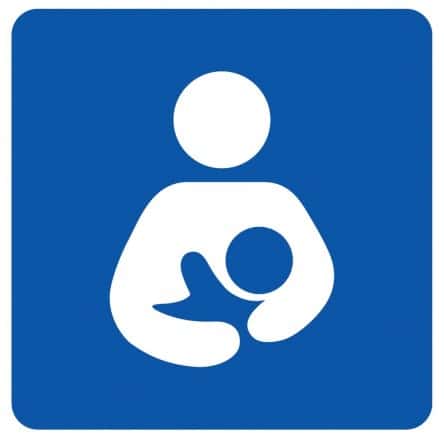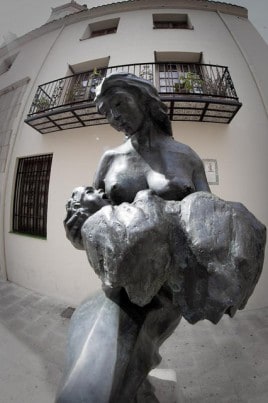“Do you mind if I feed Jonathan?” my sister-in-law asked me as she threw an oversized blanket over her shoulder – but the question she was posing to me wasn’t really “if,” it was “where.” My sister-in-law was gauging whether or not I was comfortable with her breastfeeding my 3-month-old nephew around me in her own house. I felt guilty.
I felt guilty because – somehow, not by what I’d said, or how I’d treated her, but somehow – I’d been a part of making my sister-in-law feel like a guest in her own house, feeding her own child. Awkwardness followed. If I stay in the room now, I thought, I might seem like a voyeur, a spy prying into a moment of intimacy between mother and child. But if I were to leave right then? I worried that I’d just seem like the stereotype of a celibate seminarian: Too uncomfortable and too pious to witness my nephew latching his mouth onto his mother’s breast. I stood still for a moment as all this ran through me, torn between honoring their privacy and honoring the naturalness of breastfeeding, and then my sister-in-law put me at ease. “It’s no big deal if you want to sit and stay.”
***
It’s been more than five years since I returned from living in Quito, Ecuador, but sitting there with my sister-in-law and my nephew it felt like yesterday. I lived at the Working Boys’ Center (now the Center for Working Families) for more than two years, and over that time I grew comfortable with public breastfeeding. With neither shame or guilt, the Ecuadorian women with whom I became friends would casually open their blouses to feed their children as we spoke about the weather, what we had for lunch, or what I was teaching their children that day. The normalcy of the topics parallelled, for them, the normalcy of the action. I’ll admit that this was more than a little jarring for me at first, but eventually it became quite common to see mothers sit on public benches or in the stands of a soccer field and feed their child. Other mothers and children would be automatically attracted to the feeding mother and child. They would share stories, laughter, and a paleta or an empanada. Community would be built around the feeding, and feeding became an instant, impromptu communion. Over time, as I grew more comfortable, I even allowed myself to be included, and to rejoice, in this communion.
My sister-in-law’s question reminded me that, although the United States is progressive and inclusive in many ways, public breastfeeding in the United States is not one of them. Her question – asked in her own home; posed not to a stranger but to her brother-in-law – made me wonder what women’s experience of breastfeeding here in the US is like. Is it really more of an inconvenience to be overcome than an invitation to impromptu communion?
So in the weeks following my visit with my brother, sister-in-law, and nephew, I went on the internet to see what mothers were blogging about regarding their experiences of being a new mother and the challenges of breast feeding – especially public breast-feeding. (Yes, I’m sure the imagination struggles to find a familiar spot for the celibate, 30-something seminarian reading mommy blogs like Unlatched, She Knows, and Chronicles of a Nursing Mom on his iPad.) What I found was striking.
Although there are laws in at least 42 states that support public breast feeding, the most common topic that mother’s seem to write about is the humiliating experience of being asked by store managers, waiters, and other patrons to: cover up, go elsewhere, hide themselves in the restroom, as they feed their child.1 At first it was a challenge to read about the experiences of these women, but as I continued I found myself a little overwhelmed by the amount of support that mothers showed one another. The moms offered tips with one another about how to breastfeed public without drawing attention and shared empathetic comments that encouraged them to see breastfeeding as completely natural, or just reminded each other that they were not alone in their feelings of embarrassment and self-consciousness. Sure, maybe this is not quite the same as the public communion that I witnessed in Ecuador, but as I read I found these mothers and their efforts at cyber-communion inspiring. Yes, I thought, a space where they can bond and rejoice in the experience of motherhood. Yes.
***
It will come as little surprise that all of this stirred up responses in me as well – and I did my best to pay attention to two in particular. The first response is the more straightforward: I need to be more attentive, especially more attentive to our cultural double standards here in America. I’m thinking of the way we’re comfortable as a culture with the sexualized breast, the breast found in advertisements and pornography and sexting, but not the breast that feeds a child. We have no problem using cleavage to sell beer or deodorant; the path that runs between our sexual appetite and our consumer appetites is anything but unfamiliar. Yet we get squeamish when mothers stop to feed their children in public because it seems… what… too intimate, maybe? As if that sort of deep intimacy between child and mother should not be on display? I’m realizing that I need to be more attentive to some of the ways that negative judgments can sometimes fill the gap between our images of being a woman and being a mother.
The second response cuts a little deeper, because it asks me to be more empathetic to some of the hidden struggles mother’s encounter. After I accepted my sister-in-law’s invitation to sit down, she admitted a sort of gratitude for not having to resign herself to feeding my nephew in a separate room. She talked about how, despite the constant attention and symbiotic relationship she has with my nephew, there is an isolation and aloneness that can motherhood – especially when it comes to feeding her baby in a removed space while the rest of the world keeps moving along.
At first this seemed counter-intuitive for a non-childbearing person like myself. Shouldn’t the birth of a new child, and the acts of caring for and feeding that child, mean deeper unity and not more isolation? Although this is what I thought at the time, I’m now pretty sure most mothers and fathers out there see this as… well… almost laughably naive. And this because of something we all know – that loneliness is most acute after we’ve allowed intimacy in.2 Still, despite the fact that great works of love can feel isolating, that does not give us the right to be a community that causes more isolation. Instead the call I feel is to be creatively supportive of mothers and their duties of motherhood – even very intimate ones such as breastfeeding – and to foster a spirit of inclusion in the larger community.
Although it so often is, the public intimacy of breastfeeding hasn’t always been so shocking to us. It wasn’t always the case that the Pope needed to encourage mothers to breastfeed during Church.3 Religion writer David Gibson, in fact, contends that “the earliest symbol of God’s love for humanity was the infant Jesus at Mary’s breast,” going so far as to note that it was only during the Reformation that the crucifixion had supplanted the breast-feeding image of Mary.
***
As I sat down across from my sister-in-law I didn’t know all this yet, it wasn’t that I was so comfortable. It was that by sitting down, being with one another we were – each of us – inviting the other deeper into intimacy. She by accepting me in my efforts to be with her, and me in my efforts to accept her by looking her in the eyes and talking with her as we normally would, about faith, family, and Texas A&M football. I can’t help but think that treating her normally, beginning with what was familiar, is part of what dignified both the act of breastfeeding and my sister-in-law herself. Beginning with what was normal opened a door that lead deeper into the intimacy of the moment, too. And it let me, when it seemed that I was given permission by her word or glance, look down at my nephew in her arms. It let me look for a moment and see this breastfeeding as what it was, a precious thing.
“I have calmed and quieted my soul like a child quieted at its mother’s breast; like a child that is quieted is my soul.” That’s from Psalm 131. It’s not hard in moments like this to see breastfeeding as a sacred moment of clinging and holding, unity and intimacy, one of which I am privileged to be a part.
It’s taking it these experiences as privileged and precious that lets me look toward future encounters with new mothers and feel more resolved to be attentive, accepting, inclusive; to see what is holy instead of what makes me uncomfortable. Despite our culturally-natural inclination to slide out of the room when the words “breast-pump” are uttered, or to feel awkward when we notice a leaked through shirt, the invitation is neither to run nor to pretend to an intimacy that’s not yet there. It seems to me instead that we honor the intimacy by practicing normalcy, at least that’s what I want to do. The challenge, then, for those of us invited to into such intimacy is just to continue the conversation, share in the communion, allow ourselves to be at ease with who they are as mothers and who we are as witnesses as best we can.
***
The cover image is by Flickr user 楊欣樵 (JP) and can be found here.
— — // — —
- In a compelling article entitled “Why I’m Glad Someone Told me to Stop Breastfeeding in Public,” mother and author Amber Hinds writes about an experience when a lifeguard ask her to go to the restroom to feed her child. She mentions that had this been her first child, she might have been more self-conscious and quit public breast feeding altogether. ↩
- As I thought about a seeming incongruence between feelings of isolation and acts of love, I was reminded of Mother Teresa’s spiritual writings and how in the midst of great service to the poor she felt moments of great loneliness. ↩
- I found this in my breastfeeding research, and loved it. The quick story is that Pope Francis was celebrating a baptism for families in in the Sistine Chapel when he heard a baby cry and took the opportunity as it presented itself. Not everybody was as happy about this as I was, though. ↩





